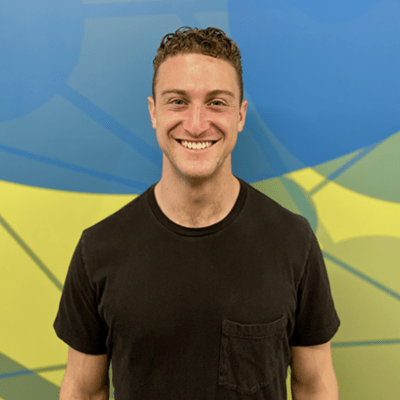Degree Program: Biomolecular Engineering and Bioinformatics, B.S.
Graduate Institution: University of Washington, working towards a Ph.D. in Molecular Engineering
Undergraduate Institution: UC Santa Cruz
Department: Biomolecular Engineering

“The ACE program is what motivated me to continue my involvement in academia and what encouraged me to pursue a career in education to hopefully become a professor one day.”
Evan Pepper graduated from the Baskin School of Engineering in spring 2018. Both as a student and after graduating, Pepper contributed to UC Santa Cruz research projects that gave him hands-on laboratory experience in the fields of molecular biology and genetics. He credits much of his success and sense of community to the UCSC Academic Excellence (ACE) program, which provided him a support network during his undergraduate education. Pepper is currently pursuing a Ph.D. in molecular engineering at the University of Washington.
Tell me about the work you did in Professor Russ Corbett-Detig’s Lab?
I joined Professor Russ Corbett-Detig’s lab in winter 2018. I volunteered in his lab for a while making next generation sequencing libraries from the model organism Drosophila. It was a great experience and I got to refine my molecular biology skills. After I graduated from UCSC, I reached out to Russ to see if there was an opportunity to work in his lab full time. At that time, there wasn’t funding for a new role, so that summer I ended up interning in former UCSC Chemistry and Biochemistry Professor Nikolas Sgourakis’s lab, conducting research on protein engineering. That fall, Russ acquired funding for a paid role, so I was able to work full time in his lab. I worked in his lab for almost two years. I was a lab manager, spearheading a lot of the molecular biology experiments. I continued making genomic sequencing libraries and working on quite a few large-scale, interesting projects, one aimed to develop an ultra-accurate sequencing method. I learned a ton working with Russ. He’s a great person, a great mentor, and an outstanding scientist.
What was your experience like on the iGEM 2017 team?
Being on iGEM was a very interesting and valuable experience. I took on the role of developing the team website. I had no prior experience with web development tools, so I taught myself, which was a difficult yet rewarding experience. Our project aimed to genetically engineer a strain of cyanobacteria to synthesize essential vitamins and medicines. We recognized that there is a global issue of restricted access to essential vitamins and medicines, especially in non-industrialized regions around the world. Our objective was to delocalize production so essential vitamins and medicines can be easily distributed and attained by everyone. The project was influenced by the superfood spirulina. Spirulina is easy to produce and is full of vitamins and nutrients. Our research goal was to synthesize acetaminophen and vitamin B12 from cyanobacteria in a lab setting to eliminate localized production. Given that this project was completed over one summer, and we all had little experience in conducting molecular biology and genetic engineering research, I think we did an incredible job and were very successful.
What are two takeaways you gained from all the research you did during your undergraduate career?
One, don’t wait to get involved in research. Just go for it. Make sure to talk to professors and see what research they’re working on and to take time to reflect on what you’d be interested in doing. Two, try whichever research you have the opportunity to do. You won’t know which areas you’re most interested in until you try it out, so don’t miss out on opportunities just because you’re not sure at that time if you’d be interested.
What’s one of your favorite memories at Baskin Engineering?
I was super involved in the ACE program throughout my entire undergrad career. I was a student in the program my first two years, then became a mentor for my last two years. My favorite memory would be the end-of-the-year ACE parties we’d have out in the Baskin Engineering courtyard. We would have so much fun hanging out and celebrating the end of the academic year. I’d say one of the most amazing experiences of my undergraduate life was being a part of ACE. If it weren’t for ACE, I don’t know if I would be in grad school right now. The ACE program is what motivated me to continue my involvement in academia and what encouraged me to pursue a career in education to hopefully become a professor one day. I am so grateful for ACE.
What are you doing now?
Getting into grad school was tough. I applied to grad school twice. The second time I had a lot more experience to add to my application from working full time in Russ’s lab, collaborating on different endosymbiosis biology projects. During that time, I knew that I wanted to pursue a field related to human health. In fall 2019, I accepted an offer to enroll in the molecular engineering Ph.D. program at the University of Washington.
My first year of grad school was entirely remote. I did three rotations to decide on which lab I wanted to work long-term during my program. I had to pursue a fourth rotation due to funding issues with the labs I rotated in. I am now doing a rotation in Professor Nitin Baliga’s Lab in the Institute for Systems Biology. I’m working on a really interesting project looking at antimicrobial resistance. The project motivation is to identify pre-existing drugs that could be used to combat the emergence of antibiotic resistance in the clinical setting. I’m learning a lot and am very interested. I hope to find myself in this lab long-term.
This block group hides your featured image, remove this block group to show your featured image again.



